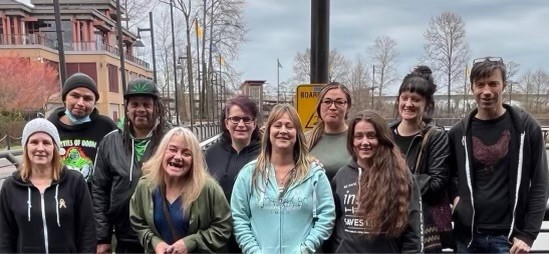Jenny-Leigh McDougall’s work keeps her on the go. An average day can involve running to local pharmacies to pick up prescriptions, dropping medications off to people in homes, shelters, hotels, or out on the street, bringing people to medical appointments, advocating for them to health professionals, and connecting them to whatever resources they may need.
McDougall is the co-founder and office coordinator of the Coalition of Substance Users of the North, based in Quesnel, B.C. She is also a person with lived and living experience of substance use whose work focuses on helping peers.
“It certainly has proven to be amazing at helping people,” she says, explaining that the organization offers a range of options, tailored to individual situations.
McDougall connects people with a spectrum of care that’s complemented by counselling, social workers and other supports, offered by the organizations she collaborates with. Some clients benefit from abstinence-based treatment and detox services, while others may be looking for opioid agonist treatment, meaning medications that help to manage withdrawal symptoms and reduce cravings for opioids, and safer supply prescriptions.
She says she meets people where they’re at and helps them go down a path they choose themselves.
“The aim of the program is to save lives,” says McDougall.
“I want people to stop hating themselves just because they’re addicted to substances.”

Jenny McDougall (back row, third from left) with members of Professionals for Ethical Engagement of Peers (PEEP), a peer advisory committee.
August 31 is International Overdose Awareness Day, an opportunity to remember those who miss out on years of life, love and connection. It is also an opportunity to support the loved ones they leave behind. This year’s theme for International Overdose Awareness Day is: Recognizing people who go unseen.
“The model Jenny [McDougall] works in is really beautiful,” says Dr. Alexis Crabtree, public health physician, for harm reduction and substance use services at the BC Centre for Disease Control (BCCDC). “There is a strong acknowledgement of the expertise of people with lived and living experience in meeting the needs of people who use substances. That acknowledgement is borne out in the services they provide.”
This expertise is instrumental to BCCDC’s work to deliver harm reduction and substance use services. McDougall is one of eleven members of Professionals for Ethical Engagement of Peers (PEEP), a committee of people with lived and living experience of substance use who regularly advise BCCDC on everything from program delivery and services, to monitoring data and trends on the unregulated drug poisoning emergency and the effectiveness of interventions, and research.
“We deliver better care when we take full advantage of the expertise of peers in designing and implementing services,” says Dr. Crabtree. “There is also an ethical imperative to involve people in the design of programs that impact them.”
McDougall was unhoused on Vancouver’s Downtown Eastside for a couple of decades.
“I know what it’s like to be out there, to be judged. To not have a bathroom or a shower and to be robbed every time you go to sleep,” she says. “If people had housing we wouldn’t be seeing them use out in the community.”
McDougall credits the dedication of people with lived and living experience to supporting people who use drugs as the main reason she was able to change paths.
“I wanted to stop so badly,” she says. “I lost my kids, I lost everything. I believed with my whole heart and soul that I would never be able to stop.”
“I really believe in peer work. That’s what changed my whole life.”
It’s been over seven years since the province of B.C. declared a public health emergency and the number of people who have lost their lives to drug poisonings due to toxic drugs continues to climb.
As part of her work, McDougall will connect people to healthcare workers who can prescribe pharmaceutical alternatives to the toxic unregulated supply under the Prescribed Safer Supply policy. She says while safer supply saves lives, it isn’t a fix all for everybody. She would like to see B.C. prescribe stronger pharmaceutical alternatives to heroin and fentanyl, to keep up with the increasing strength of the street supply and the rising tolerance levels of people who use drugs.
She also notes that opioid agonist treatment can work for people who use opioids but there’s no alternative for those with a dependence on stimulants.
“Diacetylmorphine, fentora, smoking options, that’s what people want. We’re also not getting any [benzodiazepines] prescribed. If people are addicted to those … they’re going to keep going to the street,” she says.
“We have to keep people alive so that they can make a choice to do something in a safer way or get help.”
This sentiment is echoed by Dr. Crabtree, who acknowledges that some people who use substances are going to continue to use substances.
“People deserve access to lower risk substances. They deserve to be supported with welcoming and comprehensive care no matter what their relationship with substances is at any given time.”
